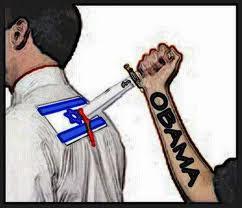Finally! Obama has spoken the truth! In an interview with New York Times Obama ball washer Thomas Friedman, he flat out said that he doesn’t worry about Israel’s survival. Thanks for finally admitting the truth Barry, but we already knew that. Now you can drop the act about having Israel’s back. Newsbusters has the summary:
I asked the president whether he was worried about Israel. [Answered Obama] Because Israel is so capable militarily, I don’t worry about Israel’s survival.”

|
| Obama Says ‘I Don’t Worry About Israel’s Survival’ |
|---|
At the end of the day, the president mused, the biggest threat to America — the only force that can really weaken us — is us. We have so many things going for us right now as a country — from new energy resources to innovation to a growing economy — but, he said, we will never realize our full potential unless our two parties adopt the same outlook that we’re asking of Shiites, Sunnis and Kurds or Israelis and Palestinians: No victor, no vanquished and work together.
Kind of like when you taunted Republicans by telling them “I won”?
“Our politics are dysfunctional,” said the president, and we should heed the terrible divisions in the Middle East as a “warning to us: societies don’t work if political factions take maximalist positions. And the more diverse the country is, the less it can afford to take maximalist positions.”
You mean, like when a President decides to flout the Constitution by issuing executive orders rewriting Obamacare and opening our borders?
But wouldn’t things be better had we armed the secular Syrian rebels early or kept U.S. troops in Iraq? The fact is, said the president, in Iraq a residual U.S. troop presence would never have been needed had the Shiite majority there not “squandered an opportunity” to share power with Sunnis and Kurds.
Poor Obama: the world continues to disappoint him. But since he knew that there was no real power-sharing happening under Maliki, wasn’t the current crisis utterly predictable?
With “respect to Syria,” said the president, the notion that arming the rebels would have made a difference has “always been a fantasy. This idea that we could provide some light arms or even more sophisticated arms to what was essentially an opposition made up of former doctors, farmers, pharmacists and so forth, and that they were going to be able to battle not only a well-armed state but also a well-armed state backed by Russia, backed by Iran, a battle-hardened Hezbollah, that was never in the cards.”